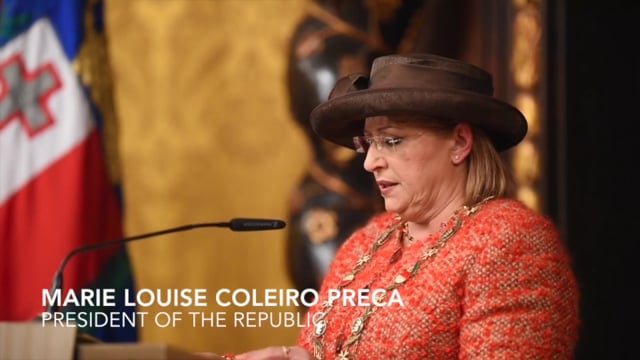[WATCH] ‘Catholic religion no longer central to cultural activity’ • President calls for ‘democracy without intrusion’
As Malta celebrates its 40th anniversary since becoming a Republic founded on work, President says thousands remains unemployed, others are exploited or working in hazardous or precarious conditions


In a speech characterised by challenging notions, President of the Republic Marie Louise Coleiro Preca today argued that the Catholic Religion was no longer central to cultural activity because of the vast changes happening in our society.
“On such an important day, we should be questioning what is secular process and religious diversity and how to act in this context,” she said.
The President was addressing the awarding ceremony marking Malta’s 40th anniversary of becoming a Republic.
She said, that elsewhere, the debate on secular process and cultural change has provoked extreme reactions from fundamentalists who felt threatened and at the same time close enough to power to impose their values.
“I believe that any positive purpose, whatever its origin, should be given space in the public sphere. This is the kind of democracy I want to see flourish in our country; democracy without intrusion, based on diversity, to be able to dialogue openly and where everyone may have the opportunity to prosper.”
Turning to the phenomenon of irregular migration, Coleiro Preca said that a caring Republic should seek the refuge of international solidarity, so that the movement of people becomes a quality experience, and not a tragic end to many hopes and lives.
“I quote pope Francis who said, I wonder if Europe is weary under the pressures of today’s challenges,” she said, adding that her thoughts were with the thousands of people who lost their lives along a difficult journey, which was meant to give them a better life.
She reiterated the need to seek international collaboration in this regard and not depend only on the national context: “History has shown negative outcomes when some countries put emphasis on the second type of solidarity.”
Coleiro Preca said an inclusive Republic expected the Presidency to dismantle the artificial boundaries that prevent us from moving close to each other, and face one another.
“This presidency will serve as a bridge so that people with diverse aspirations, desires and visions, come together and translate their differences into collaboration based on dialogue and true respect for each other.
For this dialogue to take place, different languages have to become one language, which utters the word solidarity in unison; different views become one view so that together, we can make a difference, our fears become our fear that the country is failing its vulnerable, and our aspirations become one aspiration, that fosters democracy and social justice.”
She reiterated that society could not aspire to democracy “if together we do not create a framework of thinking and new actions, if the new order does not go beyond old practices, which have hindered our way forward along the path of economic, social and environmental solidarity.”
“Genuine dialogue leads us to question: Who may speak and who may not? Who can be heard and who not? Who can dialogue with whom and from what position of power?
“This presidency will be distinguished through its efforts to move from rhetoric to action. In this regard, the presidency established a Foundation to offer a permanent structure from where the presidency, in a coherent and coordinated manner, may execute projects to celebrate life and human dignity.”
Coleiro Preca sent a stern warning against political discourse which minimises the dignity of persons on social benefits.
“The social welfare system is crucial for people in this situation, and in no way should we allow our discourse to minimise their dignity, by depicting these people as parasites and therefore must not be aided by the state. People in such situations are victims. Those abusing the system or evading taxes are not.
“The latter are among the greatest enemies of a Republic built on employment and Solidarity.”
During the presentation of Budget 2015 finance minister Edward Scicluna, in a bid to highlight the government’s crackdown on social benefits abuse, told parliament that “being a single mother is not a profession”. Other government ministers argued that people who are able to work or who can be trained to join the workforce should not remain dependent on social benefits.
Coleiro Preca, who always held social justice at heart, said poverty diminished human dignity and a fair and democratic Republic could never tolerate thousands of people living in poverty, or at risk of poverty.
“Whether we accept it or not, poverty affects us all, because it is through our taxes that poverty can be offset.”
She argued, that the recognised association between education and poverty shows the limitations of education: “As stated by many sociological thinkers in the field, we cannot attribute to education, powers it does not possess. Education can contribute extensively, along with other stakeholders, but it cannot work in isolation.”
Coleiro Preca reminded that, forty years ago, Malta pledged a Republic founded on work but today, the country was still far from fully realising this oath.
“Not only there are still thousands of unemployed people, but a number of workers are being exploited, working in hazardous or precarious conditions.
“Not all employment gives dignity. A Republic based on work should protect the dignity of the worker with the same zeal it gives to the statistics of employment. Industrial wellbeing is built on proper working conditions.”
The President said precarious employment was a disease that not only undermined wellbeing, but destroyed individuals and families. Precarious employment, she said, hindered the level playing field among employers.
“My appeal is that profit should never outweigh the urgency to give workers what is rightfully theirs; workplaces that assert workers’ dignity.”






.jpg)
















